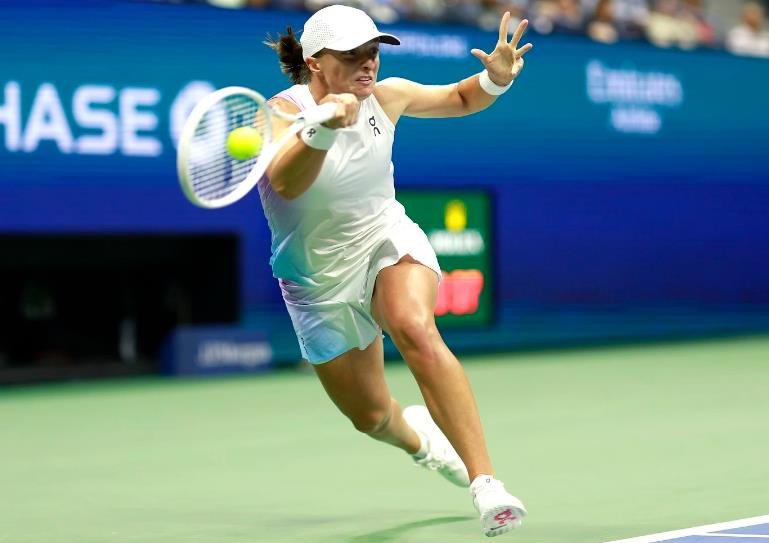The WTA Finals have kicked off in Riyadh, featuring tennis stars like Aryna Sabalenka, Iga Swiatek, and Coco Gauff. However, the event has been overshadowed by an unexpected twist—empty seats. Fans and experts are voicing their frustration over the stark lack of crowd energy in the arena, contrasting sharply with the excitement typically expected at such a high-profile tournament.
Empty Stands Despite Star-Studded Lineup
Riyadh’s stadiums, each with a capacity of over 5,000, have barely seen 10 percent attendance. According to The Telegraph, only about 400 spectators watched the match on Sunday. This low turnout has left many questioning the effectiveness of the event’s organization and the overall interest in tennis within the country.
Low Ticket Prices and Market Misjudgment
Interestingly, the ticket prices have been kept remarkably low, with starting rates around USD 6.5 or 6 Euros. Despite the affordable pricing, the expected crowd did not materialize. This has sparked a debate about whether the WTA and event organizers accurately assessed the market and audience interest in Saudi Arabia.
- Affordability vs. Appeal: Even with budget-friendly tickets, the event failed to draw a significant crowd.
- Marketing Strategies: Questions are rising about how the event was promoted and whether it resonated with local tennis fans.
- Cultural Factors: The appeal of tennis in Saudi Arabia compared to other sports may play a role in the low attendance.

Voices of Disappointment: Former Players and Fans Speak Out
The disappointment surrounding the event has been echoed by former tennis players and fans alike. Tim Henman, a former British tennis star, criticized the choice of venue, stating, “If we move past that and just look at this WTA Finals as an event, it’s extremely disappointing when you’ve got the world’s best players – Iga Swiatek, Coco Gauff – performing in front of a crowd like that today.”
Fan Frustrations
Fans attending the event are not holding back their feelings. Many expressed that despite the impressive lineup and significant financial investment, the event felt lackluster without the energy of a full stadium.
- Expectations vs. Reality: Fans expected a vibrant atmosphere but were met with empty seats.
- Engagement Issues: Lack of local engagement and promotion might have contributed to the low turnout.
- Future Concerns: Doubts are being raised about the sustainability of hosting major tennis events in the region without substantial local support.
Financial Implications and Future Prospects
The $15 million investment in the WTA Finals was intended to elevate Riyadh’s status as a global sports hub. However, the poor attendance raises concerns about the return on investment and the future of similar events in the region.
Analyzing the Investment
- Cost vs. Benefit: With minimal audience engagement, the financial benefits of the investment remain questionable.
- Brand Image: Hosting major events without local support can negatively impact the brand image of both the event and the host city.
- Long-Term Strategy: The success of future events will heavily depend on addressing the issues faced during this WTA Finals.
The Bigger Picture: Sports and Politics Intertwined
The WTA Finals in Riyadh are not just about sports; they also reflect the complex interplay between sports and politics. The event is part of Saudi Arabia’s broader strategy to diversify its economy and improve its global image through high-profile international events.
Navigating Political Terrain
- Soft Power Play: Using sports as a means to exert soft power and foster international relationships.
- Human Rights Concerns: Ongoing human rights issues in Saudi Arabia may deter local and international fans from fully supporting such events.
- Cultural Shifts: Encouraging a cultural shift towards embracing different sports requires time and genuine local interest.
What Needs to Change for Success
For Riyadh to successfully host major tennis events in the future, several key changes are necessary:
Enhancing Local Engagement
- Community Involvement: Involving local communities in the planning and promotion of events can boost attendance and support.
- Targeted Marketing: Tailoring marketing strategies to resonate with local audiences and highlight the event’s significance.
- Building a Tennis Culture: Investing in grassroots tennis programs to cultivate a strong local fan base over time.
Improving Event Experience
- Venue Selection: Choosing venues that are accessible and appealing to local spectators.
- Entertainment Value: Adding additional entertainment elements to enhance the overall experience for attendees.
- Feedback Mechanisms: Collecting and acting on feedback from attendees to improve future events.
The low attendance at the WTA Finals in Riyadh serves as a critical lesson for organizers and investors alike. While financial investment is essential, understanding and engaging the local market is equally crucial for the success of international sporting events. Without addressing these fundamental issues, future endeavors may continue to fall short of expectations, leaving both fans and organizers disappointed.
